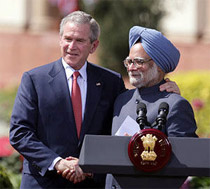|
New Delhi: With the nuclear cartel, the Nuclear Suppliers Group (NSG), due to hold its plenary session in The Hague next week, India has said it is opposed to any move to restrict transfer of enrichment and reprocessing technology (ENR) to India by the 45-nation body. According to Delhi, any such move would contradict the nuclear exemption provided to India in September 2008, government sources said.  However, the writing is on the walls for India as - all protestations notwithstanding - the NSG is set to the block transfer of ENR technology to Delhi. However, the writing is on the walls for India as - all protestations notwithstanding - the NSG is set to the block transfer of ENR technology to Delhi.
The approval of new guidelines for the transfer of ''sensitive'' nuclear material will slowly, and surely, begin to unravel the hard fought ''clean'' waiver India obtained in 2008 from the cartel. The move by the NSG to withdraw specific items from the export list will constitute a massive credibility loss for the ruling UPA dispensation in Delhi, which for long has been preening its feathers over wresting the landmark civil nuclear deal in te h face of determined domestic and international opposition. It is particularly galling for the UPA as the NSG's proposed fresh set of restrictions have the full backing of the United States of America. Under the terms of a landmark September 2008 agreement, the NSG waived its requirement of full-scope safeguards as a condition for supply of nuclear material and equipment to India in exchange for sovereign non-proliferation commitments by the Indian side. This was the 'clean' waiver that Delhi got in return for making its own commitments on non-proliferation to the nuclear cartel. The waiver provided by the NSG allowed its members to sell to Delhi any kind of nuclear equipment and material that they wished, including ENR, despite the fact that Delhi would allow international supervision over its nuclear activities in a limited manner and would continue to be a non-signatory of the Nuclear Non-Proliferation Treaty (NPT). "We have expressed deep reservations with the move to withhold transfer of ENR technology (to India) which would dilute the whole message of exemption given to us in September 2008," government sources said of the upcoming meeting at The Hague. The waiver of September 2008 extracted a number of non-proliferation commitments from India and even compelled Delhi, at the last minute, to make a formal statement listing out what it was prepared to do. A host of NSG members have already landed, or expect to land, lucrative contracts from Delhi in particular the United States. The US, it may be pointed out, already has a Letter of Intent from India promising to buy 10,000 MW worth of American reactors. What the Indian side does not expect to happen now is cherry-picking by NSG members as to what equipment they will like to export to India and what they would not. Meanwhile, on the diplomatic track, Delhi continues to behave as if all is well under control and the issues are resolvable, without acknowledging in public that the prime architect behind the Indo-US nuclear deal, the United States of America, is behind the NSG move to curtail export of ENR equipment to India. Government sources say that Delhi will continue to build its case for membership to the NSG. "Our outreach programme is going on. We don't believe the next NSG meeting will decide on India's membership but would like timelines so that a positive decision is there for the four processes," a source said. India wants a "package deal" for membership to all four international non-proliferation bodies -- Wassenaar Arrangement, Australia Group, NSG and MTCR. Though the US is said to be spearheading India's campaign for membership to these agreements both nations are shying away from resolving significant divergences in their position.
|